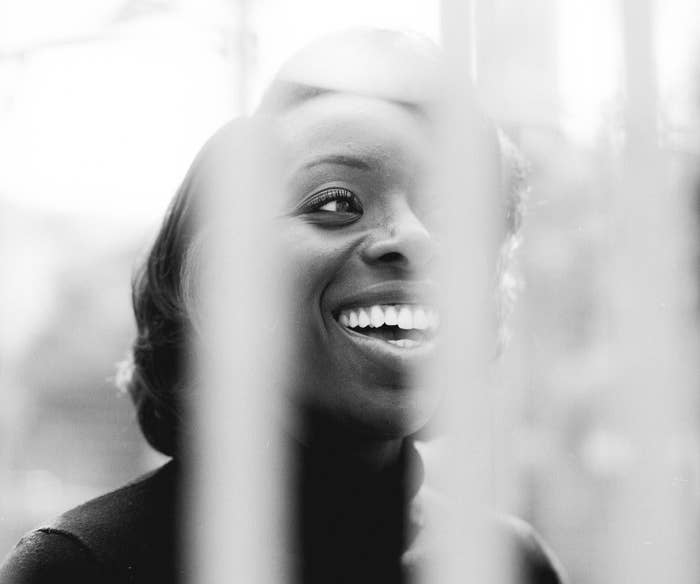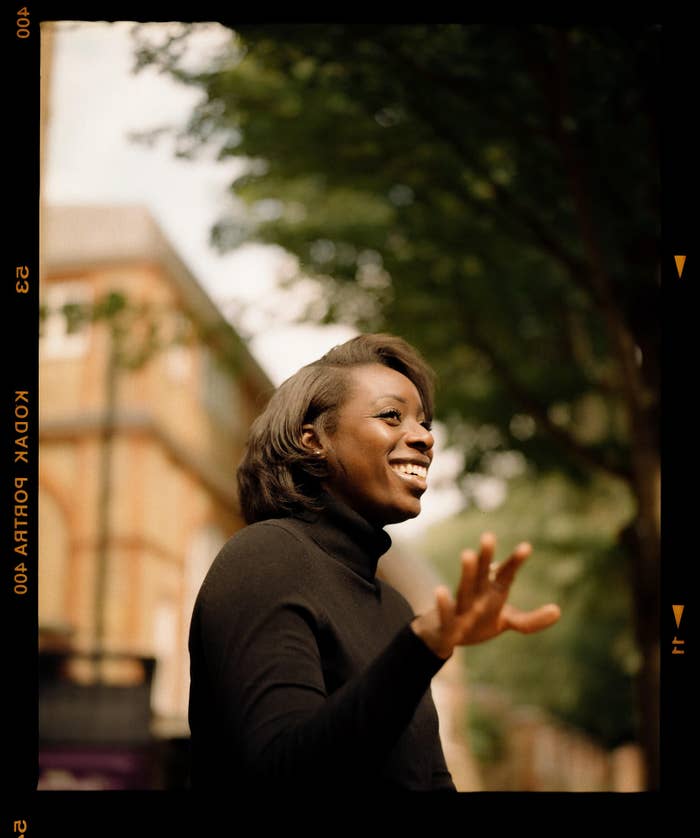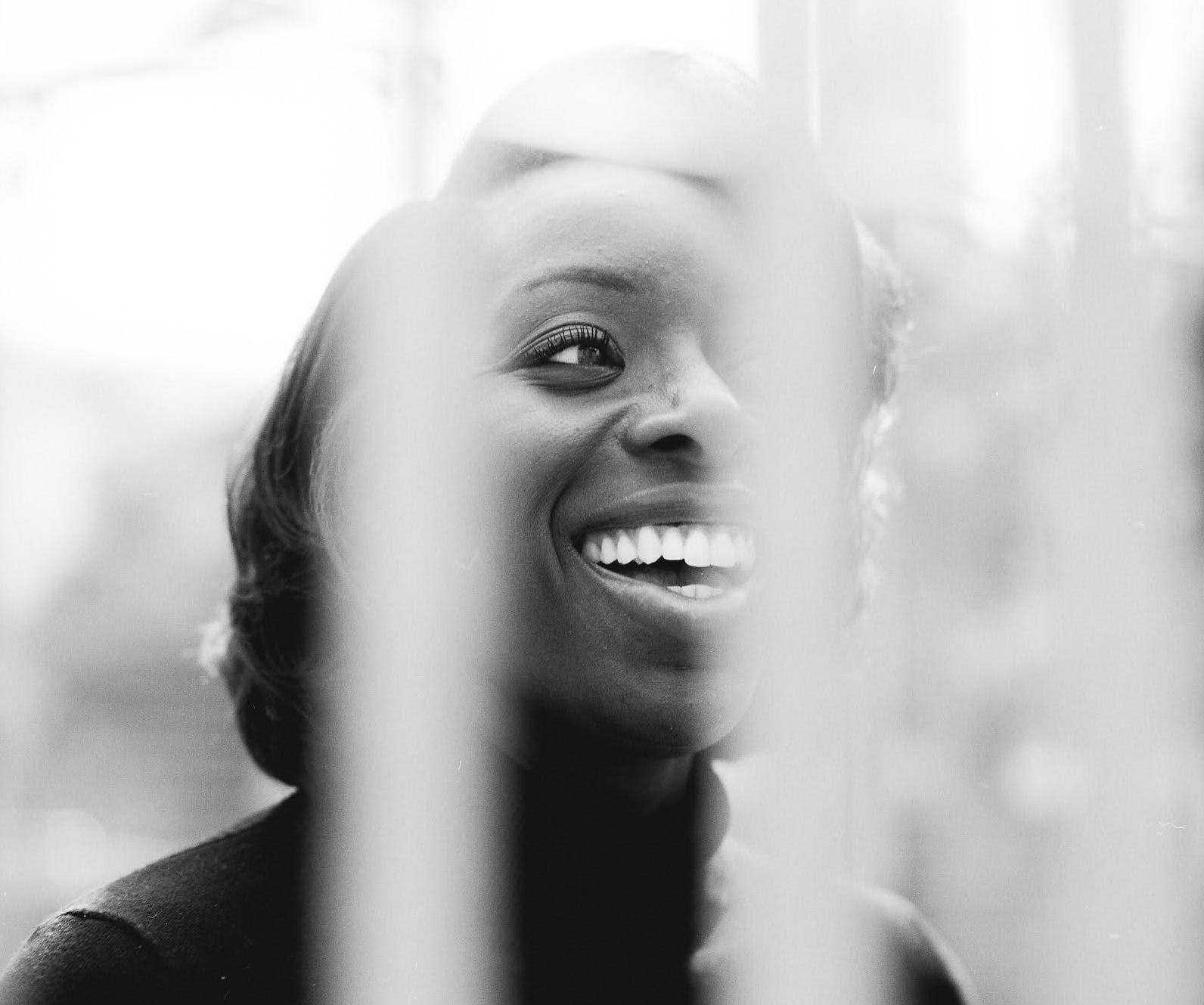
The hashtag element signifies a new generation, while 'MERKY' is the attitude and lifestyle which said generation should adopt as they strive for success. Stormzy is a living embodiment of #MERKY's core values, to the point where he recently got prank-called by some kids, created a group chat with them on WhatsApp, and then ended up playing five-a-side football with them shortly after. The MC only had to tap his phone screen a few times and make his way down to Shoreditch Powerleague for a few hours, but those random fans will probably cherish that memory for a long time to come.
The essence of #MERKY is exactly that: creating long-lasting memories that won't fizzle out, a strategy introduced by Stormzy but magnified x 10 by the work of brand manager Akua Agyemfra and her consultancy firm bea.london. Wretch 32 is another one of Agyemfra's clients. With an OG like Wretch—who's been in the game for over a decade—the branding requirements lean more towards legacy than they do constant hype and attention, and that subtle yet effective outlook has seen the revered rapper remain relevant without compromising what he stands for in an era where new acts are setting trends that can end up rendering those from yesteryear irrelevant.
Akua has also been working on projects with the Premier League—often described as 'the biggest league in the world'—while Spotify UK has solicited her expertise for their events, all following on from 10 years at Adidas. From personal branding to managing the outlook of global powerhouses, Agyemfra specialises in turning ideas into reality and making sure those ideas make sense in the bigger picture, with a particular love for the crossover between music and sport.
Complex caught up with Akua Agyemfra to discuss her career so far.
How did you get into branding and marketing?
I learned everything I know from working at Adidas. I started off as an intern and worked in the entertainment team, effectively giving shoes to artists, giving clothes to artists, and putting them in campaigns. I guess I learned all of my principles through working for a massive global brand—who are very protective over their brand—down to what something looks like, how the big the logo should be, where the logo should be placed and all that kinda stuff. That experience teaches you how to build a brand but also how to maintain and protect it. I think the first time I knew that I cared about branding was when I saw Missy Elliot and Madonna in a GAP advert—it blew my mind! I was like, "Wow! They've put these two together and they're on TV, selling jeans?" I thought it was the most incredible thing I'd ever seen. That's when I realised I cared about what brands did, advertising campaigns and stuff like that, and that was way back when I was about 17.
What goes into deciding which artists a big brand like Adidas works with?
You know what's funny? Because the UK scene is growing, it feels like there's way more artists now. But actually, when I was at Adi, it was more a case of who was bringing that person to the table and who was recommending. What we wanted to make clear at Adidas was that we're a family, so if you're in that family, we'd look after you; if you were in, you were in. There's no point in going with any brand and working with people who don't understand what you do, don't like what you do or don't believe in you as an artist. That's just a waste of time—the relationship will never be authentic. We had a lot of ears to the ground and a massive network of people. When we first meet you, we have to like you, because it's going to be long for everyone if we don't. And that method always just worked; those artists were respectful and grateful that they were included in the family, and we looked after them.
What happened after you left Adidas?
I'd always known that, at some point, I wanted to work in football but I didn't know whether I was going do that within Adidas or outside of Adidas. I just knew that, being a black female, if I turned up and said "I really like football. Can you let me in?" everyone's gonna be like: "Well, alright—what else are you bringing to the table?" So I went off and did a masters in Sports Management, specialising in the business of football. So I studied that part-time for two years, then when I finished, I was really driven to do something amazing in the football arena so I had to make a difficult decision: 'I've been at Adidas for this long, I love it, I love my team, it's a great place to work, but if I want to do more and achieve these goals for myself, I'm going to have to take the leap.' It's funny because I didn't leave with any real, concrete plan. Football was a more difficult world than I'd anticipated. There's so much more money involved, it just changes the dynamic of everything. I know footballers, I know agents, and I know the right fit is going to happen. When I left Adidas, I knew that Stormzy and Wretch were two of my biggest passion projects and I knew I wanted to be part of those teams going forward. So I asked both of their managers if they needed some help with branding and, luckily—thank God!—they both said yes. And that's kind of how it started. I didn't know where it was going to go, but it's been an incredible two-and-a-half years so far and I've been very blessed.
What does being a brand manager for a musician involve?
The aim is to create a strategy to really make big moments in culture, where people are talking about 'a particular thing' that you were instrumental in or created. Basically, the aim is to do really dope shit. You can't really put that on your CV, but that's effectively what it is and what I always strive to do. So with Stormzy, he's somebody who's got really big ideas for his legacy and what he wants to do, as an artist, as a person, as a human being, in this country, around the world, in music and outside of music. So we just talk about different ideas... I usually get a text at like three o'clock in the morning like: "AK, I've been thinking…" We'll usually start a conversation from there.
The best ideas often come at 3am.
This is it! This is it. When you're up and you're just thinking and you've got quiet and your mind to yourself... When he texts me and he's like "is this idea too big?", my answer to him is usually "never too big; let me and go ask the question." We'll then find out somewhere along the line if it's something we can do or not, and that's how all these things come to life. Then with Wretch—a lot of artists are now at that level where the young ones are coming through and they're having to either diversify and grow from a career perspective—so with Wretch, we just sit and talk a lot about the future and what we want him to look like in 10 or 15 years; what that legacy looks like, and how we start it from now. It's literally an A-Z of how you come up with the idea all the way through to execution, and making sure it fits in with your brand. You're almost protecting the look and feel of it, in the moment, and in the long-term as well. That's the best way I can describe what a brand manager does. You never want to get to a point where somebody's like, "Why did he do that? That doesn't make sense." That's exactly what we're trying to avoid.
What goes into the branding process to ensure an OG like Wretch 32 remains relevant? Generally speaking, UK artists don't last as long as him.
It's harder for OG artists, especially if you've been around the block and been through the cycle a few times. With someone like Wretch, with him, he's older, he's wiser, he's kinda now a father-figure in UK music. So, for him, it's about being very selective about what we do, and everything we do has to come from a passion point. It has to be something he cares about, believes in and will give 110% to. Every artist that is still around today doing sick things, that's all underpinned by music. You can't just be out here with no music, trying to do everything in the world, because then people are questioning you, doubting you even. And Wretch is a beast when it comes to music. He's always in a studio. He's always recording. He's always writing... I don't even understand how he's got anything left to say [laughs]. If you think about the standard of his lyrics, it's like: "How do you think of new stuff?" He doesn't write anything down—he doesn't write his lyrics down—he'll just be in the studio and he'll come up with a concept, then he'll pace up and down the room and just go in and record. It's an incredible thing to watch. With Wretch, the focus is on how to expand with his writing, how to expand with telling stories, how to expand creatively, how to become a true storyteller of our time and experiences. There was a documentary on YouTube that was about the Broadwater Farm riots. Watching that helps you to understand him more, I think. He comes from a stock of people that do things from passion, do things that are important to them, because they want justice and for the the world to be put right.
With branding, it's easy to assume that it instantly means big deals and big campaigns. But I feel like Wretch's branding is understated, but still very effective. How do you go about achieving that?
Yup! You're branding is everything. Even Wretch's brand on Instagram makes sense, because it's consistent. It's about being really uplifting and positive; it's about doing, being up, feeling good, feeling energetic, and then being able to use that energy to go and produce your best work. The 2012 campaign we did with Adidas for the London Olympics might be one of the biggest campaigns he ever does because of what it was: an Olympic Games, on home soil. Then there was a campaign with Jacamo. I understood their vision of how that wanted to re-brand and I understood how Wretch could fit into that, and it worked perfectly. It was important to have something at a high impact time as well, just before the World Cup. In this 'down period', where we're doing lots of things but there's not necessarily an album out, you need to refresh people's minds. Not that people forget, but things move so fast. If you've not go music out, or if you're not in a film, or you're not on TV, or if you're not writing a book, it's like: "Woah! Woah! Woah! Where are you?" Not everything that we do with Wretch is gonna be massively in your face, but more a reminder that we're here and still working.

What was your involvement in Spotify UK's first live event, Who We Be?
With the Who We Be event in London, I worked across artist liaison, working with artists across their entire run—from when they were signed up to do the show, through to promoting and the actual day itself. It was about four months in total. Spotify are keen to show that they're here to support artists, and they're a very driven brand in trying to achieve that message. They're bringing playlists to life and giving another platform for artists to come and showcase, which feeds back into getting more streams. The Who We Be events are really important.
What are some of the challenges when connecting big businesses with artists who may say controversial things in their music?
A lot of brands aren't equipped to deal with a particular kind of artist. What's really interesting, to me, is that everybody wants to be involved in black music but nobody wants to take on what potentially comes with black music. Because actually, nobody in life is squeaky clean. Where a lot of black music comes from a very real and personal place, the nature of what particular artists talk about are their real life experiences. I don't have to know the ins and outs of everything that goes on in the street to be able to empathise from a perspective where I get it, and I'm willing to stand alongside it because I understand the culture as a whole. There's so many people that want to be involved in it because Stormzy's so popular, or because everyone's talking about Giggs, or because there's this new artist called Loski, or all the kids at my son's school, they're all talking about this new rapper. But it's like, okay, cool, when you're ready to sit down with a new artist and his team and have a conversation, you need to know 360 where these artists come from, and you have to be willing to stand up and speak on behalf of them and back them. You also have to know that, if there's ever a slip-up or if anyone ever falls down or goes backwards—unless it's beyond salvage—you are not going to run. It has to feel like a true partnership, one where both our brands can grow together.
With the campaign for Gang Signs & Prayer—from a branding point of view—was there a lot of pressure to elevate the #MERKY brand to the level of anticipation that Stormzy had built up around the album?
At the time, I'd heard the album and thought it was incredible and everyone would love it, so my job is to just add some sauce. Give it a boost. Collate all the partners that we work with to support it and find new ones, too. Think about creative amazing ways that we can build on sales and getting people to engage with the album. So that could be sending Manchester United a long email with all the different things we want to do at Old Trafford, then crossing our fingers for a few weeks hoping they want to do it, or putting on a last-minute live performance at Westfield. It was all about how I could use what I do to help elevate the album, because I had no doubt in my mind that it was going to do what it needed to do. It just so happened that, because the album was amazing and his fan-base is so strong—coupled with my little sprinklings on the top—we made it so that you saw him everywhere. I had never done an album run so I learnt a lot that week, very quickly.
#MERKY has grown considerably outside of music releases. What goes into making an event like #MERKY Festival such a big deal, and not just another event?
For me, looking forward, it's like, this is now something that's cemented in people's diaries. People are already looking forward to the next one and the last one wasn't even six months ago. One thing I learnt very quickly with this team is how fearless everyone is. I've come from this corporate background where I've got so much red tape—I've got partners, I've got stakeholders—so when I'm like "let’s do this", I've got one hundred different questions coming my way, so a lot of ideas get shut down. When I first started, Stormz would be like: "AK, why don't we do this?" I'd then reply: "I dunno if we can do that." He'd then say, "Why?" To which I'd say: "Yeah, good question. I dunno why. Let me go and figure it out." People partying in the sun, watching their favourite artists perform—what could go wrong? Now we're thinking about how we can make it bigger and better next time, but still keeping it simple. Once you complicate things, it's less likely to work.
Putting on a party for your fans doesn't offer a direct return like more album sales or followers online, so what are the benefits of hosting events with no clear returns?
The Thorpe Park thing was literally a late night text: "AK, I think I wanna go to Thorpe Park. I wanna bring the mandem, and I also wanna bring some fans." I was reading the text thinking "this boy is actually mad—he's crazy. How am I gonna do this?!" But again, an email, a phone call, a tweet and some conversations later, it's happening. With Stormzy, we'll never understand it because we're not artists, but a lot of artists often say without their fans, they wouldn't be here and Stormzy genuinely believes that. He knows that he's London born and raised, but also London-bred, from an artist's perspective.
What influenced #MERKY to set up a publishing deal with Penguin Random House?
Stormzy was a writer in school. He used to write poems, and was sick at English. The amount of autobiography offers that come about or offers saying write a book, it can be about anything you want. So when these things arrive on my desk, my thinking is how can we flip that and turn it into something more impactful, more epic? I remember saying to him: "It would be sick if we could turn this into a label—what if we did that?" It took so long to put this deal together but Penguin Random House understood it was going to be amazing. We've got one book on the way, we're writing another book at the moment that's in development, and we're at a stage where people can just submit writing. That, for me, is the most exciting bit. The response that we got when we announced it is bigger than the response I've seen on nearly anything outside of the album. Even if you don't end up getting published by #MERKY, we've opened up a publishing world to you. I would love to think that if even if we couldn't get a book on #MERKY, we could put you in touch with people we know, so you can still get something published—even if it’s not through us. For me, that would be incredible.
Of all of #MERKY's moves, I feel like the decision to introduce the #StormzyScholarship might be the biggest one. It's not cheap to fund someone's entire university fees. What made Stormzy want to commit that level of finance and resources?
I think, for him being in school and getting GCSE results that were so sick that he could've continued on a trajectory of going to Cambridge. Obviously he didn't—he ended doing music—but he wanted to give the opportunity that he could've taken to give it to kids on their way to getting that. To be really clear, it's for kids that have been offered a place at Cambridge. What that helps us do, from a younger age, is getting those kids on the journey at a much earlier age. I didn't even look at Cambridge or Oxford when I applied university, because it was never for me. Which is crazy. Why was it never for me? If I had identified earlier on that I really want to go to an Oxbridge university, that would've changed the scope of everything—how I worked, how I studied, how I revised, how I listened in class, all of that stuff. It's so important to know from early that if you study, and you get your head down and you're gifted, there's absolutely no reason why you can't go to Oxford or Cambridge. Why not? That thinking is the first step, where you change your mindset.
There's also a big focus on the interview process when applying to Cambridge and Oxford, and a lot of people stumble at that stage of the application.
I feel like that's where a lot of people fail their interview, because they might feel like they can't be themselves. The thing is, teachers are so instrumental. So many people that we interviewed when we visited Cambridge, so many people were saying when they spoke of their inspirations, "I had this one teacher...", whereas if you've got a teacher telling you the exact opposite, that impacts you in the same way. And that's why we need more voices, to be like, "Guys! you can do this. If you want it, you can have it." People forget: Cambridge University had identified that there was a problem. With our platform and what we want to do, we want to help address that problem, of not having enough black students at Cambridge. It's really that simple. And we're gonna use Stormzy's platform and voice to magnify that message. So if it means more kids are thinking of this as a realistic opportunity or a realistic proposition for their lives—that, for me, is half the job done.
What's coming up next from yourself?
I definitely want to grow bea.london, continue to work on amazing projects and bring my network of some of the best people around together. I think for me personally, I came out raring to go with football and, as of yet, I haven't quite hit those goals. That's been a blessing and a curse so far. From a blessing side, it's been a chance to step back, view how things work and connect with more people, but it's also allowed more people to see what I actually do. So much of what I do is so public, and in your face, so if there's anything that my name is next to or my name is behind, at least it makes sense immediately. Like, I don't have to explain the Pogba transfer announcement because you'll already know. Sports is definitely an area I want to build on—I've started to connect with more people outside of football, like within the NBA, NFL, and other circles. What I do within work is transferable, so as long as I'm into the product or the athlete or the team or whatever it is, I can work on it in the same way. So I'm really hoping to expand on that crossover between sports and music, but before that, I really need a holiday.

